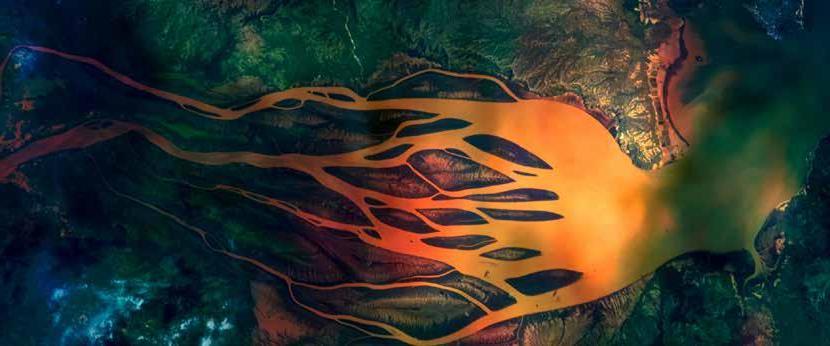
4 minute read
Foreword from the President and CEO
from State of the World report - Establishing the value of water - the business case for change
by FIDIC
Nelson and I welcome you to this second 2021 State of the World report entitled, Establishing the value of water - the business case for change.
The first report, Time to $ Tn-vest, published on 18 February 2021, focused primarily on the significant scale of the investment needed to meet the world’s infrastructure requirements including meeting the United Nations Sustainable Development Goals (SDGs). While the first report mentioned strategies to raise the necessary funds, we also noted that engineers have the ability to reduce financing requirements through prudent use of their innovative skills.
This second report continues with such ambition, exploring and addressing the world’s water challenges, the financial and social value we need to place on water and the business case for action. This report therefore builds upon the themes included in the Time to $ Tn-vest report as well as the 2015 State of the World Report on Water Challenges.
It is important that we clarify that for convenience, we use the term “water” in this report in the broadest sense to include all elements of the world’s water resources including potable water, wastewater, stormwater and our oceans. This report also addresses the myriad of related water challenges due to climate change.
This report also touches on the impact of Covid-19 in the short and longer terms which, as noted in our first report, may well have created an increased awareness that global crises can occur. Hopefully, we can build on this awareness and make significant progress toward meeting infrastructure needs.
The world has changed dramatically in the past 12 months. Covid-19 has not only changed working patterns but has also reduced economic activity to lows never seen before. This will add to the challenge of financing infrastructure requirements.
While FIDIC will continue to address many issues in our future State of the World reports, the choice of “water” as the first ‘technical’ subject is appropriate due to its importance to human life, ranging from the billions of people without adequate basic drinking water and sanitation to the growing water scarcity problem throughout the world. All this also takes place in a world where the direct and indirect connection between climate change, environmental sustainability and water challenges is changing rapidly.
Since the FIDIC 2015 State of the World Report on Water Challenges was published, some progress has been made but much more needs to be done. This report discusses how some of this progress is the result of more attention being paid to our water challenges which, in turn, are also developing due to goals set such as the United Nations Sustainable Development Goals which put in place clear targets for 2030, two of which (Goals 6 and 14) are directly concerned with water.
FIDIC and the infrastructure sector more widely needs to communicate more clearly the importance of all elements of water in our daily lives and if the investment required is to take place, the economic and social value may need to adjust. It should not be underestimated that the challenge of providing universal services in the water sector is not a small one and it will require government decision-makers and the public sector to invest more in solutions and for the private sector to also step up and invest to play its role.
This report is part of our effort to more broadly communicate ‘state of the world’ issues which engineers can help address. This report includes discussion of issues related to the value and pricing of water services, which going forward must meet a very important, delicate and critical balance, between providing services universally to meet the SDGs, improve livelihoods, food, energy, health etc as a necessity but
using policy and pricing mechanisms which allow significant investment to take place without pricing people, towns, areas or even regions out of vital services.
We also note issues related to the financial and social costs of our water challenges which are not routinely ‘priced’.
Our next report will focus on innovative approaches which are occurring or should be considered in addressing our water challenges. These two reports, in combination with our first report on the scale of the investment challenge, will therefore hopefully help to establish a logical way forward to improve our progress in addressing our water challenges.
It is therefore my pleasure as the president of FIDIC along with our CEO, Nelson Ogunshakin, to present FIDIC’s views on our water challenges especially the need to recognise how important it is to develop solutions more rapidly.
Whilst the entire sector, from financiers through to end consumers, will need to be engaged to deliver effective solutions to our water challenges, engineers will form a key part of successful investments. They will do so by ensuring that the right cost-effective projects are developed in the planning phase, timeframes are reasonable and quality is not compromised.
It is in the inception and planning phases of projects where the best engineering is often done. The cost of this phase is only a small fraction of the overall project cost, but it has enormous influence on the quality, whole lifecycle cost and outcomes.
Sustainable projects that consider the future will ensure that we develop infrastructure that is not only fit to provide for the current generation but for future ones as well.
The world therefore continues to face a myriad of complex and longstanding water challenges. It is imperative that all stakeholders commit to addressing them more vigorously. The engineering community can provide leadership in developing innovative solutions. As noted in FIDIC’s 2015 report, this will not only involve technical strategies. Equally or perhaps more importantly, it will include appropriately involving all stakeholders in pursuing solutions to our water challenges.

William Howard
President, FIDIC

Dr Nelson Ogunshakin OBE
Chief Executive Officer , FIDIC








